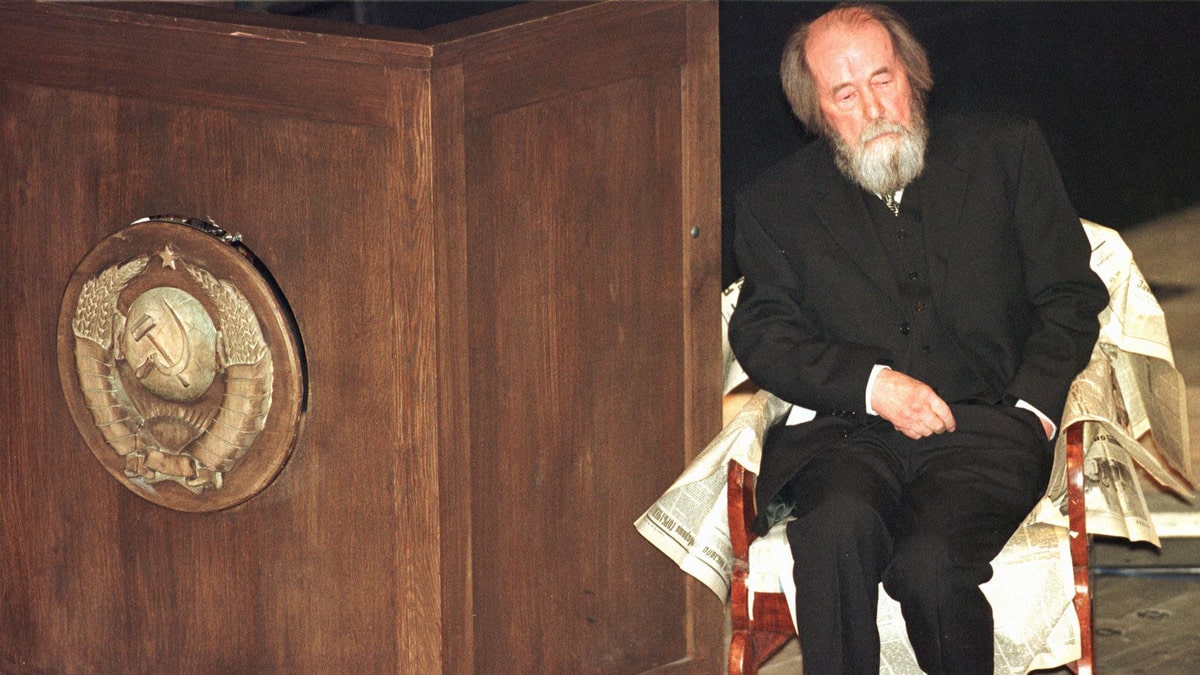
In February, we marked the 50th anniversary of Solzhenitsyn's forced exile to the West, when he was expelled from Russia. We know of his journey that led him to Vermont, where he lived a life of intellectual work, dedicated to building a work that illuminated the history of Russia as well as the metaphysical foundations of totalitarianism in modernity, inseparable from its social mechanisms. However, Solzhenitsyn did not doubt one thing: that he would one day see his country again. He will return there alive. He was stripped of his citizenship by an ideological regime that required not loyalty to country but ostentatious submission to orthodoxy, and his entry into opposition in the name of basic demands for freedom and loyalty to country occurred before the ideology of his false representation.
Solzhenitsyn's courage and genius make him an exceptional being. But it would be a mistake to think that his journey is completely alien to us. It is certain that our era is not the era of labor camps, and this cannot be considered a detail. The millions of deaths caused by communist totalitarianism have left a forever visible scar on the face of humanity. But ideological exile exists again. But it takes another form: it is internal exile, in a society that reconnects with a fixed doctrine, a diverse doctrine, which one must adhere to ostentatiously, by chanting its slogans and complying with its rituals, and among them we find condemnation. From “fanatics” and other resistant people, who do not want to kneel before the new religion, nor embrace its icons.
The informant, who transmits the ideological misconduct of his neighbour, is the model citizen of our time. He's a keeper. Therefore it is denounced. He knows that the slightest deviation in ideological behavior can inspire illegitimate behavior and ideas among his citizens, and push to deviation those who until then had deep down their reservations about the regime. Bad examples can lead to an epidemic of bad ideas. This is why the punishment must be drastic. Laws are made to convict deviants: these convictions are intended to brand them legally with the stamp of shame, and publicly reduce them to these convictions. Thus, the current system creates outcasts by labeling them as hate preachers.
Internal exile has a public name by which he does not identify himself. They call him a man of the “far right” – that is the mark of the devil. What matters to him if he does not claim that, and criticizes this group and claims to belong to others: his opinion does not matter. The gatekeepers of the dominant ideology decide each person's public record, and then repeat it. This recording is done in the name of transparency: we explain that it allows ordinary people to know who they are dealing with when they hear someone. In fact, it is above all a matter of telling the common man in advance what this or that individual should think, even before he speaks. Here's a warning: If you think well of a man with a dirty label, you'll be invited to wear that label too. Should we remember that this label has no descriptive value, nor does it have any intellectual value?
The wearer of the dirty mark will see his life as broken, at worst, and complicated, at best. We see it everywhere in the West, and it will probably be banned professionally. Or maybe a banking ban. If he was attacked in the street by an Antifa militia member, people would say he looked for him. If he is a parent, and refuses to have his children taken in by the crazy system scholars who promote gender theory, his parental rights will be suspended. This is the accepted form of deprivation of citizenship. To avoid all this, the common man often lies. He is doomed to a divided existence. He says what he has to say to function in society, even if he secretly votes from time to time for reprehensible parties. We believe that if electronic voting comes one day, it will no longer allow itself such audacity. Because we can take it. In the meantime, he will have gone crazy.
I will come back to it. Solzhenitsyn hoped to return to his country, and he succeeded. Instead, the man of our time hopes to find his own music, which he keeps deep in his heart like the music of his childhood or his ancestors. At the very least, he wants to regain his freedoms, break out of the policed society, and joke around with his friends in the bistro without a single remark that could be taken as a guilty joke. To live a day without respecting the regime's prohibitions is a way to enter into a state of dissidence without knowing it. We will be told that the word opposition is not appropriate for this purpose. However, the machine to crush souls exists. The wheel of diversity is turning. Solzhenitsyn, who lives among us, sensed this and wanted to warn us. His life for us is the life of a brilliant man.






